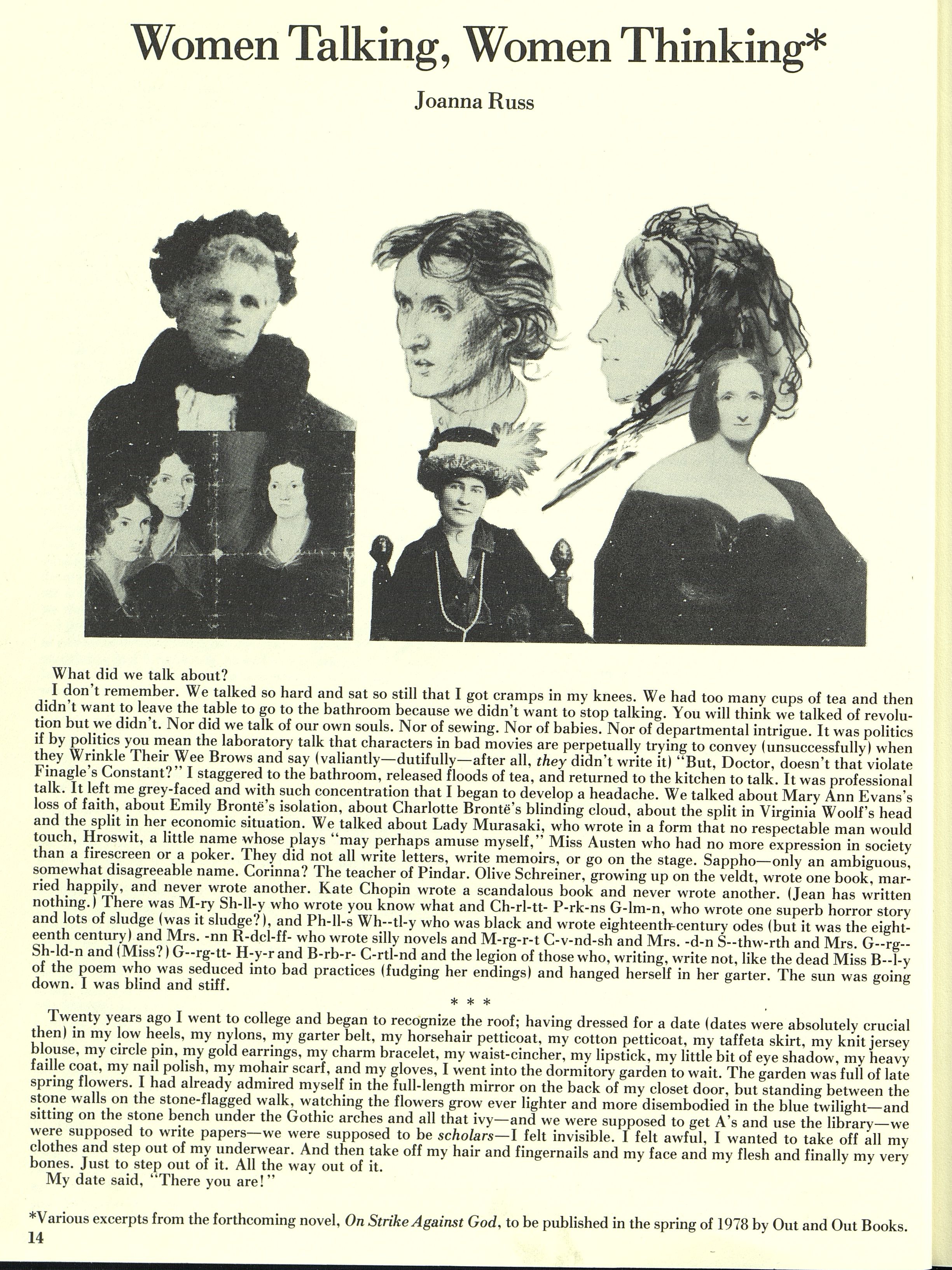View the Issue
Read the Texts
Mexican Folk Pottery
Editorial Statement
The Aesthetics of Oppression
Is There a Feminine Aesthetic?
Quilt Poem
Women Talking, Women Thinking
The Martyr Arts
The Straits of Literature and History
Afro-Carolinian "Gullah" Baskets
The Left Hand of History
Weaving
Political Fabrications: Women's Textiles in Five Cultures
Art Hysterical Notions of Progress and Culture
Excerpts from Women and the Decorative Arts
The Woman's Building
Ten Ways to Look at a Flower
Trapped Women: Two Sister Designers, Margaret and Frances MacDonald
Adelaide Alsop Robineau: Ceramist from Syracuse
Women of the Bauhaus
Portrait of Frida Kahlo as a Tehuana
Feminism: Has It Changed Art History?
Are You a Closet Collector?
Making Something From Nothing
Waste Not/Want Not: Femmage
Sewing With My Great-Aunt Leonie Amestoy
The Apron: Status Symbol or Stitchery Sample?
Conversations and Reminiscences
Grandma Sara Bakes
Aran Kitchens, Aran Sweaters
Nepal Hill Art and Women's Traditions
The Equivocal Role of Women Artists in Non-Literate Cultures
Women's Art in Village India
Pages from an Asian Notebook
Quill Art
Turkmen Women, Weaving and Cultural Change
Kongo Pottery
Myth and the Sexual Division of Labor
Recitation of the Yoruba Bride
"By the Lakeside There Is an Echo": Towards a History of Women's Traditional Arts
Bibliography
Joanna Russ
*Various excerpts from the forthcoming novel, On Strike Against God, to be published in the spring of 1978 by Out and Out Books.
What did we talk about? I don't remember. We talked so hard and sat so still that I got cramps in my knees. We had too many cups of tea and then didn't want to leave the table to go to the bathroom because we didn’t want to stop talking. You will think we talked of revolution but we didn't. Nor did we talk of our own souls. Nor of sewing. Nor of babies. Nor of departmental intrigue. It was politics if by politics you mean the laboratory talk that characters in bad movies are perpetually trving to convey (unsuccessfully) when they Wrinkle Their Wee Brows and say (valiantly—dutifully—after all, they didn’t write it) "But, Doctor, doesn’t that violate Finagle's Constant?" I staggered to the bathroom, released floods of tea, and returned to the kitchen to talk. It was professional talk. It left me grey-faced and with such concentration that I began to develop a headache. We talked about Mary Ann Evans's loss of faith, about Emily Brontë's isolation, about Charlotte Brontë's blinding cloud, about the split in Virginia Woolf's head and the split in her economic situation. We talked about Lady Murasaki, who wrote in a form that no respectable man would touch, Hroswit, a little name whose plays "may perhaps amuse myself," Miss Austen who had no more expression in society than a firescreen or a poker. They did not all write letters, write memoirs, or go on the stage. Sappho—only an ambiguous, somewhat disagreeable name. Corinna? The teacher of Pindar. Olive Schreiner, growing up on the veldt, wrote one book, married happily, and never wrote another. Kate Chopin wrote a scandalous book and never wrote another. (Jean has written nothing.) There was M-ry Sh-ll-y who wrote you know what and Ch-rl-tt- P-rk-ns G-lm-n, who wrote one superb horror story and lots of sludge (was it sludge?), and Ph-ll-s Wh--tl-y who was black and wrote eighteenth-century odes (but it was the eighteenth century) and Mrs. -nn R-dcl-ff- who wrote silly novels and M-rg-r-t C-v-nd-sh and Mrs.-d-n S--thw-rth and Mrs. G--rg--Sh-ld-n and (Miss?) G--rg-tt- H-y-r and B-rb-r- C-rtl-nd and the legion of those who, writing, write not, like the dead Miss B--l-y of the poem who was seduced into bad practices (fudging her endings) and hanged herself in her garter. The sun was going down. I was blind and stiff.
Twenty years ago I went to college and began to recognize the roof; having dressed for a date (dates were absolutely crucial then) in my low heels, my nylons, my garter belt, my horsehair petticoat, my cotton petticoat, my taffeta skirt, my knit jersey blouse, my circle pin, my gold earrings, my charm bracelet, my waist-cincher, my lipstick, my little bit of eye shadow, my heavy faille coat, my nail polish, my mohair scarf, and my gloves, I went into the dormitory garden to wait. The garden was full of late spring flowers. I had already admired myself in the full-length mirror on the back of my closet door, but standing between the stone walls on the stone-flagged walk, watching the flowers grow ever lighter and more disembodied in the blue twilight—and sitting on the stone bench under the Gothic arches and all that ivy—and we were supposed to get A’s and use the library—we were supposed to write papers—we were supposed to be scholars—I felt invisible. I felt awful, I wanted to take off all my clothes and step out of my underwear. And then take off my hair and fingernails and my face and my flesh and finally my very bones. Just to step out of it. All the way out of it.
My date said, "There you are!"
I've spent a lot of my time in the library here, picking out obscure references to memoirs written by bad ladies two hundred years ago and novels by worse ladies who, although personally blameless, wrote wicked books: A Romance of the Pyrenees.Marianna or The Puritan's Daughter. Weird, ghastly stuff. Five romances under the pseudonym By a Lady. Domestic sentiment. Gothic castles. Purity. If only I can reduce this pulp to pulp and spread it out into some kind of shape. Dead voices, haunting and terrible: I want, I need, I hope, I believe. What sort of homes did they have? Did they do their own cooking? Did they expect to get pregnant every year? (See Mrs. Defoe's journal.) The awful constriction, the huge skirts. Mrs. Pepys' dress allowance (''the poor wretch," her husband called her). "How are we fall'n, fall'n by mistaken rules!" "Women live like Bats or Owls, labour like Beasts, and die like Worms." "Anyone may blame me who likes." "How good it must be to be a man when you want to travel." "John laughs at me, but one expects that in marriage." "It had all been a therapeutic lie. The mind was powerless to save her. Only a man..." "I / Revolve in my / Sheath of impossibles—" Scholars don’t usually sit gasping and sobbing in corners of the library stacks.
But they should. They should.
Joanna Russ is the author of a novel published by Dell Books, We Who Are About To, and of the science fiction novel, The Two of Them, to be published by Putnam's. This spring Daughters, Inc. will present her fantasy novel, Kit's Story: A Tale of Magic. She lives in Bellevue, Washington.

